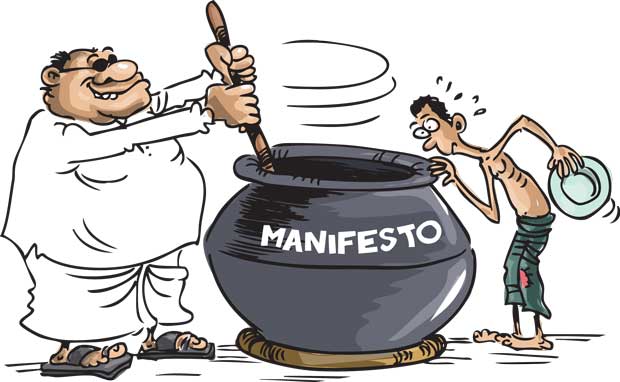Reply To:
Name - Reply Comment

Several main political parties have launched their manifestos for the August 17 general election. It is interesting to note that these manifestos have been published halfway through the election campaigns in spite of the fact that the political parties were well aware since the beginning of this year that a general election was likely to be held after April.
This points to how serious the political parties are in the matter of manifestos, which are going to the unsigned covenants between them and their voters. The leaders of almost every party in the country have gone before the people without such a policy framework and even now there is hardly any time for the essence of their manifestos to reach people at grassroots level.
In the meantime, politicians have already given promises, some of which are not necessarily included in their manifestos. And some of their promises are clearly unrealistic. For instance, the United People’s Freedom Alliance (UPFA) faction led by former President Mahinda Rajapaksa has gone on record by promising a minimum salary of Rs.25,000 for public sector employees.
These are the same people who had pledged to increase the salaries of public sector employees by Rs.2,500, one tenth of the present promise made at the 2010 presidential election and went back on their word after they won the election. They had also ridiculed the New Democratic Front (NDF) led by Maithripala Sirisena at the presidential election when it promised to give an increment of Rs.10,000 to the same employees, claiming it was hardly realistic. Seven months into that claim they want the people to believe that they would give a minimum salary of Rs.25,000, while accusing the new government of ruining the economy.
Another important manifesto to be taken into account is the one presented by the Tamil National Alliance (TNA). In a sense, the TNA is comparatively genuine in presenting this manifesto since it has not changed what it had presented at the Northern Provincial Council (NPC) election held in September 2013, irrespective of the impracticability of many of its promises. A person who peruses these two manifestos would find that both are almost the same except for jumbling of sentences in some places and removal of a part about the rights of the Muslims from the latest one.
However, as it did at the NPC election, the TNA has given ammunition to the southern nationalists to attack it. For instance, the main Tamil coalition had demanded in its manifesto the re-merger of the Northern and Eastern Provinces, acceptance of the Tamil people’s right to self-determination and direct foreign investment in the Northern and Eastern Provinces. And it also had claimed that “credible evidence points to over seventy thousand civilians having been killed in the last stages of the military onslaught.”
Already Tissa Attanayake who crossed over to the Mahinda Rajapaksa camp during the presidential election has stated that the TNA manifesto is a danger to the country’s sovereignty. One may argue that this is what the extremists in the North and the South want. Tamil extremists can tell the Tamil people now that Sinhalese leaders are against the rights of the Tamils. On the other hand the Sinhalese leaders could tell their lot that Tamils are going to divide the country, thereby both extremists across the ethnic divide would mutually benefit from this manifesto. The TNA has been asking for the rights of Tamils at every election in the past and stops at that giving the party an opportunity to repeat the demands at every election.
Sri Lanka is unique in not fulfilling any of the election promises. During the 1970 general election the SLFP led by Sirimavo Bandaranaike promised to provide each citizen with two measures of rice for a week at a concessionary rate. In turn the UNP at the next general election pledged to provide eight pounds of grain for each person each week. Chandrika Kumaratunga and Mahinda Rajapaksa repeatedly promised to abolish the executive presidency.
It is now up to the people to gauge the validity of the promises given by politicians before casting their vote on August 17.